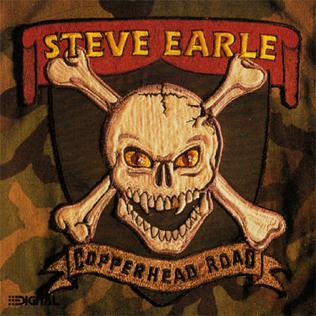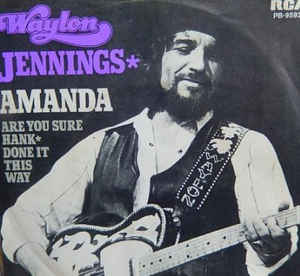Related Research Articles

Copperhead Road is the third studio album by Steve Earle, released in 1988. The album is often referred to as Earle's first "rock record"; Earle himself calls it the world's first blend of heavy metal and bluegrass, and the January 26, 1989 review of the album by Rolling Stone suggested that the style be called "power twang".
"Mammas Don't Let Your Babies Grow Up to Be Cowboys" is a country music song first recorded by Ed Bruce, written by him and his wife Patsy Bruce. His version of the song appears on his 1976 self-titled album for United Artists Records. In late 1975 and early 1976, Bruce's rendition of the song went to number 15 on the Hot Country Singles charts. This song was featured on Chris LeDoux's album released January 20, 1976, Songbook of the American West.

Wanted! The Outlaws is a compilation album by Waylon Jennings, Willie Nelson, Jessi Colter, and Tompall Glaser, released by RCA Records in 1976. The album consists of previously released material with four new songs. Released to capitalize on the new outlaw country movement, Wanted! The Outlaws earned its place in music history by becoming the first country album to be platinum-certified, reaching sales of one million.
"Fallin' Out" is a song written by Denny Lile, and recorded by American country music artist Waylon Jennings. It was released in May 1987 as the second single from the album Hangin' Tough. The song reached number 8 on the Billboard Hot Country Singles & Tracks chart.
"Wrong" is a song written by Steve Seskin and Andre Pessis, and recorded by American country music singer Waylon Jennings. It was released in May 1990 as the first single from his album The Eagle.
"This Time" is a song written and recorded by American country music artist Waylon Jennings. It is the title track from the album This Time and was released in April 1974 as the album's first single. The song reached No. 1 on the Billboard Hot Country Singles chart in June 1974 and was his first of fourteen country No. 1 hits.

"Amanda" is a 1973 song written by Bob McDill and recorded by both Don Williams (1973) and Waylon Jennings (1974). "Amanda" was Waylon Jennings's eighth solo number one on the country chart. The single stayed at number one for three weeks on the Billboard Hot Country Singles chart.

"Just to Satisfy You" is a song written by American country music singers Waylon Jennings and Don Bowman in 1963. Jennings included the song in his performing repertoire, and on radio, where the song became a local hit in Phoenix, Arizona.

Sure Feels Good is the 18th solo studio album released by American country artist Barbara Mandrell. The album was released in July 1987 on EMI America Records and was produced by Tom Collins. It was Mandrell's first album released under EMI America since leaving MCA Records one year earlier.
"Only Daddy That'll Walk the Line" is a song written and originally recorded by American country music singer Jim Alley and was also co-written by his father Gene Alley. It was made famous by American country music singer and musician Waylon Jennings.

"Can't You See" is a song written by Toy Caldwell of The Marshall Tucker Band. The song was originally recorded by the band on their 1973 debut album, The Marshall Tucker Band, and released as the album's first single. It was re-released in 1977 and peaked at number 75 on the Billboard Hot 100. Cover versions of "Can't You See" have charted for Waylon Jennings and the Zac Brown Band with Kid Rock (2010).
"The Days of Sand and Shovels" is a song written by Doyle Marsh and George Reneau, and recorded by American country music artist Waylon Jennings. It was released in April 1969 as the second single from his compilation album The Best of Waylon Jennings. The song peaked at number 20 on the Billboard Hot Country Singles chart. It also reached number 1 on the RPM Country Tracks chart in Canada.
"Women Do Know How to Carry On" is a song co-written and recorded by American country music artist Waylon Jennings. It was released in June 1982 as the third single from the album Black on Black. The song reached number 4 on the Billboard Hot Country Singles & Tracks chart. The song was written by Jennings and Bobby Emmons.
"Never Could Toe the Mark" is a song written and recorded by American country music artist Waylon Jennings. It was released in June 1984 as the first single and title track from the album Never Could Toe the Mark The song reached number 6 on the Billboard Hot Country Singles & Tracks chart.

"America" is a song written by Sammy Johns, and recorded by American country music artist Waylon Jennings. It was released in September 1984 as the first single from his compilation album Waylon's Greatest Hits, Vol. 2. The song reached number 6 on the Billboard Hot Country Singles & Tracks chart.
"Waltz Me to Heaven" is a song written by Dolly Parton, and recorded by American country music artist Waylon Jennings. It was released in January 1985 as the second single from his compilation album Waylon's Greatest Hits, Vol. 2. The song reached number 10 on the Billboard Hot Country Singles & Tracks chart.
"Will the Wolf Survive?" is a single by American Chicano rock band Los Lobos. It was released in 1984 as the second single from their album How Will the Wolf Survive? The song reached number 26 on the Billboard Top Rock Tracks chart and number 78 on the Billboard Hot 100.
"My Rough and Rowdy Days" is a song recorded by the American country music artist Waylon Jennings. It was released in September 1987 as the first single from the album A Man Called Hoss. The song reached number 6 on the Billboard Hot Country Singles and Tracks chart. It was written by Jennings and Roger Murrah.
"The Conversation" is a song recorded by American country music artists Waylon Jennings and Hank Williams Jr. Originally, the song was included on Williams Jr.'s 1979 album Whiskey Bent and Hell Bound. The track was later reissued on Jennings' 1983 album Waylon and Company, which consisted almost entirely of duets, and was released as the album's second radio single. A music video was made to promote the single, a rarity for country music at the time. It was the first for Jennings and the second for Williams, with his first being "Queen of My Heart". The song was a moderately successful hit and reached number 15 on the Billboard Hot Country Singles & Tracks chart.
"Which Way Do I Go " is a song recorded by American country music artist Waylon Jennings. It was released in January 1989 as the second single from the album Full Circle. The song reached #28 on the Billboard Hot Country Singles & Tracks chart. The song was written by Johnny MacRae and Steve Clark.
References
- ↑ Whitburn, Joel (2004). The Billboard Book Of Top 40 Country Hits: 1944-2006, Second edition. Record Research. p. 113.
- ↑ "Steve Earle Chart History (Hot Country Songs)". Billboard.
- ↑ Mooney, Thomas (2018). "15 Rare Gems from Waylon Jennings". Wide Open Country.